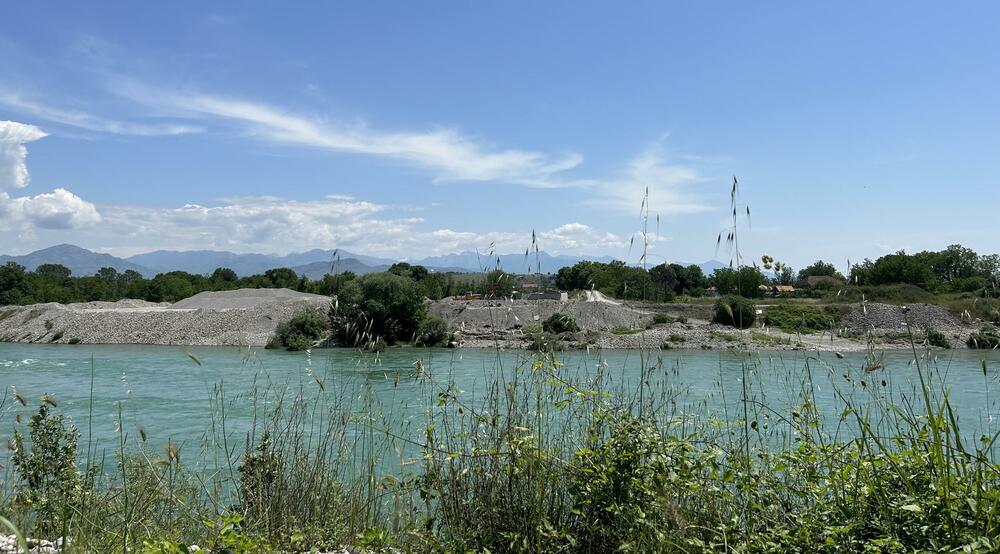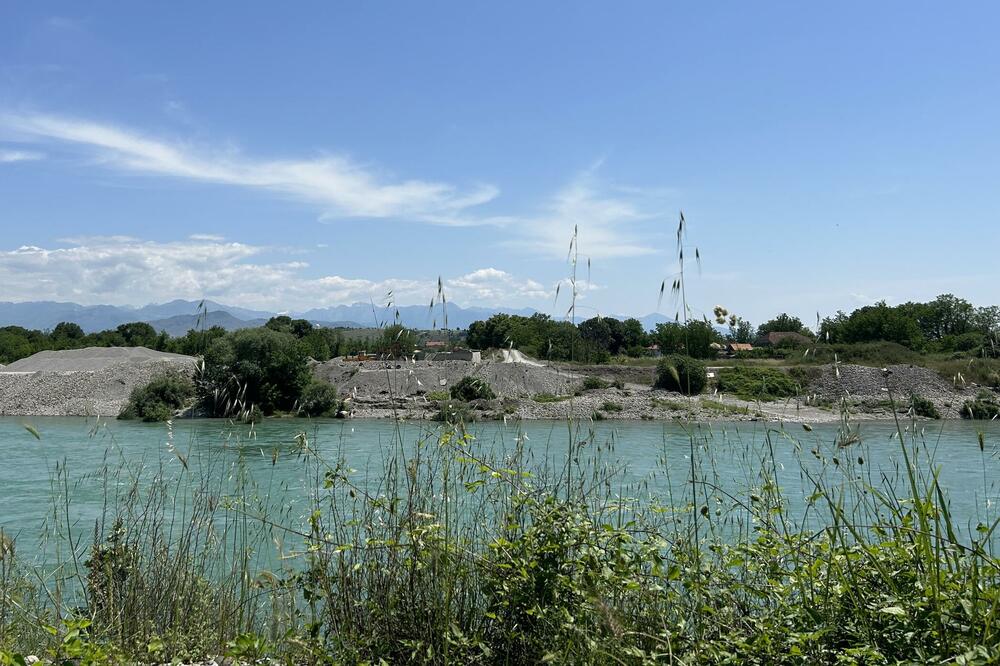Piles of gravel from all sides, machines working along the coast, widened river bed and landslides on both sides of the bed, damaged biodiversity... Thus, the course of the Morača has been devastated for years by uncontrolled and illegal exploitation of gravel. But there are still pictures like this on other rivers in Montenegro. Although these are criminal acts, the judiciary has not adequately responded to this crime for years.
How Center for Investigative Journalism of Montenegro (CIN-CG) reveals that, out of 25 criminal proceedings initiated due to the illegal exploitation of gravel in the last five years, only five have been completed. Two were rejected and three sentenced to symbolic punishments - two fines of 1.700 and 800 euros and one suspended sentence.
The threatened punishment for the criminal acts for which the prosecution charged the defendant is imprisonment from three months to five years and a fine. Therefore, even those few final judgments are in turn below the minimum stipulated by law.
Although the Government banned the exploitation of gravel six years ago, it made senseless the decision on the moratorium, leaving the possibility for the exploitation to continue through the so-called regulation of the bed. Along the bed of the Morača, as well as other Montenegrin rivers, frantic exploitation continued, and the state suffered multimillion-dollar damages.
A combination of state determination, strict application of the law, strengthening of institutions, improvement of coordination and alignment with international standards, according to the opinion Irma Muhović from the Montenegrin Society of Ecologists (CDE), are essential factors in overcoming the problem of illegal exploitation of gravel.
She notes for CIN-CG that the lack of effective enforcement of justice and punishment of those responsible for the illegal exploitation of gravel creates a negative signal and undermines efforts to combat the problem.
"Insufficiently harsh sentences or a low conviction rate will not only discourage perpetrators, but may also encourage further illegal activities," she warns.

In order to solve this problem, he concludes, it is crucial for the state to show determination and apply strict punishments and sanctions, and it is also necessary to strengthen institutions and provide adequate resources and capacities for the efficient implementation of court processes.
"Building an effective monitoring and control system for gravel mining, along with rigorous punishment of law breakers, can be of great help in curbing illegal gravel mining," she notes.
Two deferred prosecutions and one suspended sentence
Two proceedings initiated in the Basic State Prosecutor's Office (ODT) ended with delayed prosecution, he was fined 1.700 euros Dear Marash and his company "PE Mar" - for the criminal offense of "illegal business, banking, stock exchange and insurance activities".
He was fined 800 euros Milivoje Mugoš - and for two criminal acts. In addition to the charge against Maraš, Mugoša was also convicted of "illegal occupation of land" which, according to the law, is punishable by a fine or imprisonment for up to one year.
In both cases, the prosecution was represented by the current prosecutor of the Special State Prosecutor's Office Vukas Radonjic, who was then a prosecutor in the Basic Prosecutor's Office. In the meantime, he moved to work as a special prosecutor.
The Institute of Deferred Criminal Prosecution can be applied for criminal offenses for which a fine or a prison sentence of up to five years is foreseen, and this penalty is decided exclusively by the prosecutor who is acting in the case.
The only prison sentence, a suspended three-month sentence, was awarded Danilo Petrović, the owner of the company "Cijevna komerc", for the same criminal offense for which Mugoša received a fine - "illegal occupation of land".
The court appreciated Petrović as mitigating circumstances that he has not been convicted, that he is older, and that he is married and the father of four children.
The institution of the Protector of Property and Legal Interests of Montenegro joined the criminal prosecution against the defendant, but the court did not appreciate this as an aggravating circumstance.
In July of last year, he was given a suspended sentence, and he will not go to prison if he does not commit a new crime in the next year. The judge of the Basic Court in Podgorica was the judge Ivana Becic.
The Prosecution charged Petrović with the mildest form of that criminal offense, even though the verdict established that the cadastral parcel in question is a river. The more serious form of this criminal offense is "if the occupied land is part of a protected forest, national park or other land with a special purpose, the perpetrator will be punished with imprisonment from three months to three years".
According to the Law on State Property, rivers also belong to natural resources.
In Podgorica Basic State Prosecutor's Office (ODT), in addition to these five, another 12 cases were initiated and investigations are ongoing.
In the Special State Prosecutor's Office (SDT), three cases were formed in connection with the exploitation of gravel - two against the company "Montenegro Petrol" from Podgorica, one of which was handed over to ODT, and one against "Cijevna komerc".
These two investigations are ongoing in the SDT, and CIN-CG has not received an answer to the question of whether there is any progress in the investigation in these two cases.
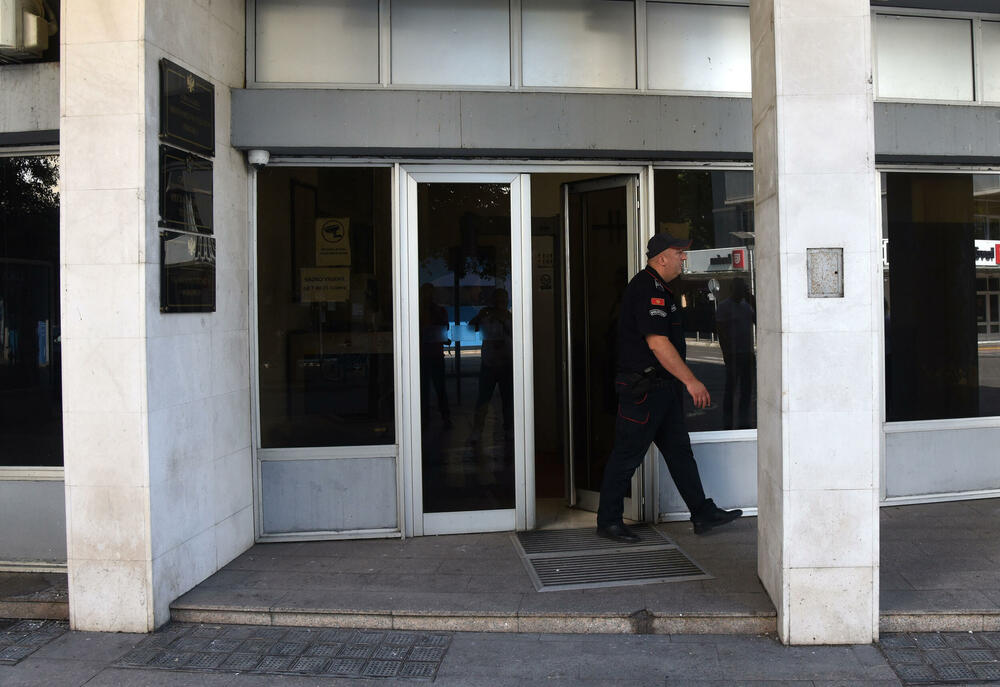
In Kolašin ODT, one complaint against CRBC, the Chinese company that built the highway, as well as "Montenegro Petrol" - due to theft of a protected natural asset was rejected. Two other applications against the Chinese company ended up in court.
Proceedings are ongoing against CRBC and the director of the Chinese company Hey Shiqiang. In one case, they are being tried for the criminal offense of building a facility without registration and documentation for construction that causes damage to the environment.
"By excavating gravel material from the bed of the Tara River, without previously established environmental protection measures, the accused caused damage to the environment to a greater extent and over a wider area," reads one indictment.
In the second case, they are charged with the destruction and damage of protected natural property. The indictment reads:
"They were accused of exploiting the river sediment on a stretch 100 meters upstream from the plot... they destroyed a natural asset - the Tara river, whose basin is included in the biosphere reserve, as part of the UNESCO program, and enjoys national protection".
The prosecution blames the inspections, the inspections blame the judiciary
The authorities do not agree on who is responsible for the lack of an adequate response from the state, instead they pass the "ball" to each other.
The prosecutor's office claims that the efficient processing of reports related to the illegal exploitation of gravel largely depends on the actions of the inspectors who have to identify the owners of the machines they find in the river bed, and to demand the assistance of the police... It is also noted that after the police in each case the prosecutor should also be informed. This is important, the prosecutor's office notes, because "usually a few months pass from the date of the inspection to the date of filing the report, which makes it even more difficult to prove."
The Prosecutor's Council recently, on its own initiative Steva Muk, a member of that Council from the non-governmental sector, requested and received information from the prosecutor's offices about what was done in the cases that were initiated due to the exploitation of gravel. However, that's all TS has done on the matter so far.
"The work of state prosecutors in these cases should be intensified. Better coordination between inspections and urgency in delivering reports from the field to the police and the prosecutor's office are needed," Muk pointed out for CIN-CG.
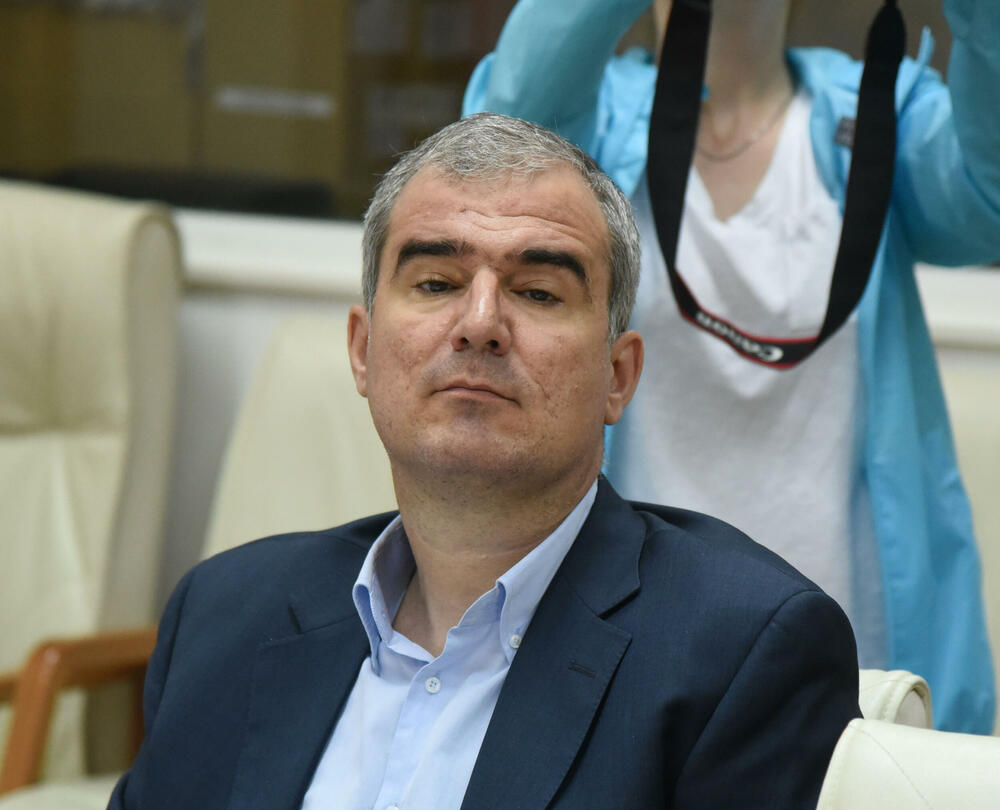
He added that there are too many cases that have been in the works for a long time, and few that have seen an epilogue.
Muk emphasizes that the head of the State Prosecutor's Office in Kolašin, in an interview at the TS session, pointed out the importance of timely handling of competent inspections. Among other things, they should urgently submit reports from the field to the police and the prosecutor's office, so that police-prosecutor activities can be undertaken to identify persons and gather evidence.
"Without this, effective action by the police and prosecution is most often impossible," concludes Muk.
In response to questions from CIN-CG, the Directorate for Inspection Affairs said that they were surprised by the attitude of the prosecutors. They claim that they don't have any feedback from the prosecutor's offices that they didn't do something well and that they should do something additional. They see the problem in the criminal policy of the courts and the quality of the investigative actions carried out by the prosecutor's office.
"A better investigation, clear orders from the prosecutors to the police, securing evidence, that is not the inspection's job, but theirs," the Director of the Administration points out. Ana Vujosevic.
Inspector Radulović: Prosecutors and judges devalue our work
Her colleague, the water inspector Miodrag Radulović, emphasizes that prosecutors and judges will not do their job.
"The results of the processing are very bad and devalue our work a lot", assesses Radulović.
In addition, he notes that the mild penal policy of the courts makes the work of inspectors even more meaningless.
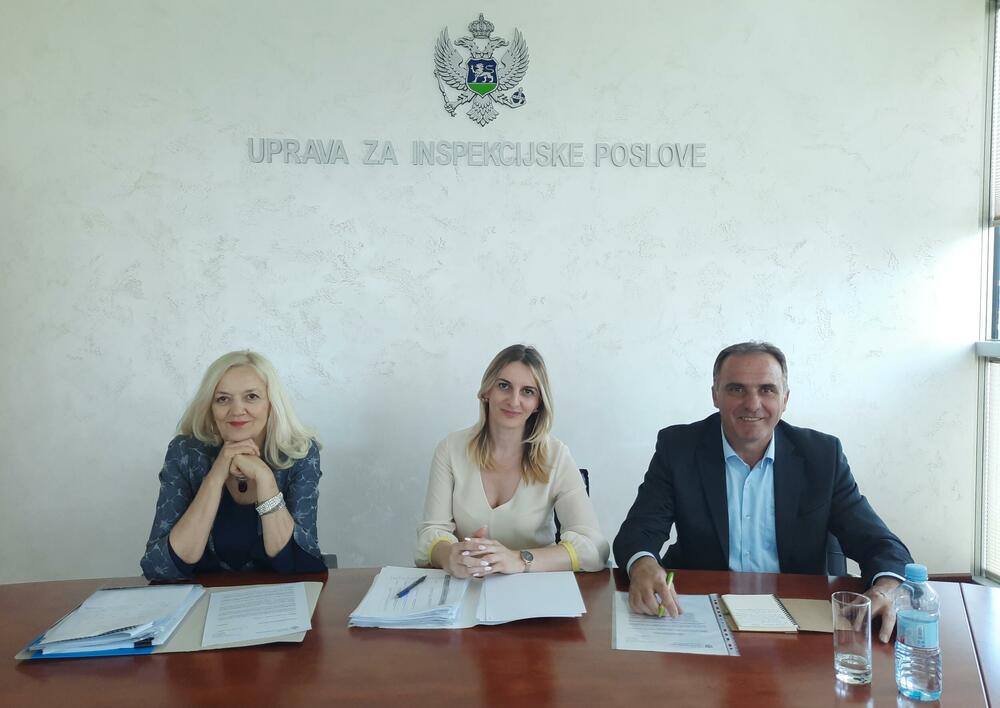
Inspector Radulović gives an example of gravel exploitation in Berane. After they determined that 5.000 cubic meters of material, the price of which is around 100.000 euros, had been stored, they forwarded the case to the prosecutor's office, which determined that there was no criminal offense.
He adds that they appealed to the High Prosecutor's Office, which sent the case back to the Basic Prosecutor's Office for re-decision.
"It is economic crime and they are angry with us for filing complaints, because they have to do their job," says Radulović.
The second case is even more drastic, and it talks about the attitude of the Misdemeanor Court towards exploiters. Radulović says that he filed misdemeanor charges against the Chinese CRBC twice. In the second, he indicated that this company is repeating the same criminal act. The court combined the two proceedings into one and fined CRBC 800 euros.
The inspector can impose a minimum fine of 1.200 euros on the spot, and if he assesses that the illegal economic profit is greater than that figure, he should initiate proceedings before the court.
Miodrag Radulović says that the inspectors usually estimate that the case is for the court, and the court sets a fine below 1.200 euros.
"Thus, our work is completely devalued. It is even more important that those who extract gravel have no reason to stop when they see how they will be punished", explains this water inspector.
Director of the Directorate for Inspection Affairs Ana Vujosevic confirms his colleague's story. He claims that the situation is not much better in the Misdemeanor Court either, and that mostly suspended sentences are handed down.
"The least problem for those people who take hundreds of thousands of euros is whether they want to keep quiet for half a year," Vujošević said.
She emphasizes that inspectors always act promptly, that their phones are never turned off, that they work even at night, after working hours, on holidays...
"I said several times that they would call me and that I would provide an inspector at any time in 20 minutes, but they never called me," she emphasizes.
He adds that over 1.000 inspections were carried out in two years, over 50 criminal charges were filed and over 100.000 euros in fines were collected.
"The only tangible result was from the inspection," concluded Vujošević.
And while the authorities shift the blame to each other, there remains hope that the rivers are not irretrievably lost, and that the judiciary will finally start the fight against this "scourge". It's the only way to stop crime.
Nothing yet from the environmental department in the prosecutor's office
Chief environmental inspector Veselinka Zarubica points out that the court expert must determine the extent of the devastation, not the inspection.
"There must be traces of the theft of state property and environmental devastation on a larger scale," she says.
He explains that the prosecutors, among other things, justify their lack of action on issues of endangering the environment by saying that this matter is not close to them, and that special departments should be created to deal with environmental crime.
"But that has been talked about for 30 years," concludes Zarubica.
Chief water inspector Miodrag Radulović says that from the beginning of the year to May 24, that inspection had 174 controls on the illegal exploitation of river sediments.
"Two criminal reports and one supplement to the criminal report were filed, three misdemeanor orders of 1.600 euros were issued, and four case files were submitted for evaluation for the existence of a criminal offense," explains Radulović.
He adds that in one case a measure was imposed prohibiting the disposal of material that was found to be exploited, in one case the files were submitted to the Protector of Property and Legal Interests of Montenegro, and in two cases to the agricultural and forestry inspection.
The Prosecutor's Council has not commented on the reports it receives
A member of the Prosecutor's Council, Stevo Muk, stated for CIN-CG that the Supreme Court did not reach a conclusion or take any other action after receiving information about the actions of the prosecution in cases of "illegal gravel exploitation".
He adds that he asked the TS to issue a conclusion requesting from the competent prosecutor's offices re-information on the handling of cases related to the illegal exploitation of gravel, from the date of submission of the previous report on the same topic. He says that TS accepted his proposal.
"In this way, we will show a permanent interest in the actions of state prosecutors' offices and provide monitoring of the dynamics of work in these cases. The prosecutor's council did not make an appropriate conclusion, recommendation or similar in relation to the previous reports," reminds Muk.

Bonus video:



